QueryDsl를 이용한 쿼리 수와 실행시간 개선 여정기
Table of contents
개선하기로 한 이유
일단 결과물을 완성시켜야 한다는 생각이 앞서서 쿼리문을 잔뜩 남발했다.
‘쿼리문을 여러개 날려도 원하는 결과만 반환되면 되니까?!’ 라고 생각했었다. 🤔
먼저 문제점을 살펴보자.
내가 진행했던 SNS 프로젝트에서 알람을 조회하는 기능이 있었다.
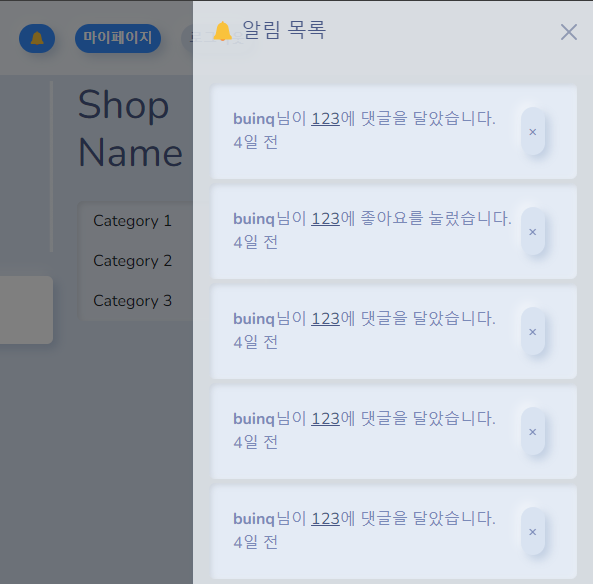
위 기능은, 내가 작성한 글에 댓글을 달거나 좋아요를 다른 사용자가 입력했을 때 목록을 가져와서 최신 알림 순으로 보여주는 기능이다.
그렇다면, 이 기능을 위해서 몇개의 쿼리를 날렸었을까?
코드적 차이와 Querydsl을 이용한 개선
public Page<AlarmListDetailsDto> getDetailAlarms(String requestUserName, Pageable pageable) {
//user 유효성 검사하고 찾아오기
User requestUser = userRepository.findByUserName(userName)
.orElseThrow(() -> new SNSAppException(ErrorCode.USERNAME_NOT_FOUND));
Page<Alarm> alarms = alarmRepository.findByUser_IdOrderByCreatedAtDesc(requestUser.getId(), pageable);
List<AlarmListDetailsDto> alarmsDto = new ArrayList<>();
//post id와 user id가 아닌 post title 과 userName 을 넣기 위해..for Each 사용
for (Alarm alarm : alarms) {
Long fromUserId = alarm.getFromUserId();
Long postId = alarm.getTargetId();
String fromUserName = userRepository.findById(fromUserId)
.orElseThrow(() -> new SNSAppException(ErrorCode.USERNAME_NOT_FOUND)).getUserName();
String title = postRepository.findById(postId)
.orElseThrow(() -> new SNSAppException(ErrorCode.POST_NOT_FOUND)).getTitle();
alarmsDto.add(new AlarmListDetailsDto(alarm, fromUserName, title));
}
log.info("🔔알림 조회 끝 userName : {}");
return new PageImpl<>(alarmsDto);
}
원래 로직은 위와 같았다.
먼저, 알람 조회를 요청한 ①사용자를 DB에서 조회하고, 그 사용자의 기본키에 해당하는 ②알람을 모두 조회한 후
그 알람의 갯수만큼 for문을 돌려서 알람 엔티티가 갖고있는 알람을 발생시킨 사용자의 id와 게시글 id를 이용해서
③알람을 발생시킨 DB에서 사용자를 조회하고 ④알람이 발생한 게시글을 DB에서 조회해서 dto를 구성했다..
단순히 코드로만 봐도 최소 4번의 쿼리를 날리는데,
사실 사용자의 수와 게시글의 수가 늘어나면 쿼리문이 2개씩 더 늘어나는 엄청난 나비효과가 있었다..

알람을 발생시킨 회원이 한명 늘자, 쿼리문이 하나 증가했다.
만약 게시글이 증가하면, 또 쿼리문의 수가 계속 늘어날 것이다..
같은 조건에서 QueryDsl로 개선한 로직을 적용하니
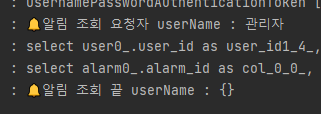
놀랍게도 한개의 쿼리문으로 같은 반환값을 얻어낼 수 있었다.
import com.growith.domain.alarm.dto.AlarmGetListResponse;
import com.querydsl.core.types.Projections;
import com.querydsl.jpa.impl.JPAQueryFactory;
import lombok.RequiredArgsConstructor;
import java.util.List;
import static com.growith.domain.alarm.QAlarm.*;
import static com.growith.domain.post.QPost.*;
import static com.growith.domain.user.QUser.*;
import static com.querydsl.core.group.GroupBy.groupBy;
@RequiredArgsConstructor
public class AlarmCustomRepositoryImpl implements AlarmCustomRepository {
private final JPAQueryFactory jpaQueryFactory;
@Override
public List<AlarmGetListResponse> getAlarms(Long userId) {
List<AlarmGetListResponse> result = jpaQueryFactory.from(alarm)
.where(alarm.user.id.eq(userId))
.join(user).on(user.id.eq(alarm.fromUserId))
.join(post).on(post.id.eq(alarm.targetId))
.orderBy(alarm.createdDate.desc())
.transform(groupBy(alarm.id).list(
Projections.constructor(AlarmGetListResponse.class,
alarm, user.nickName, post.title)));
return result;
}
}
작성한 QueryDsl 로직은 위와 같다.
먼저, 알람 조회를 요청한 사용자의 id(기본키)로 alarm 데이터를 모두 가져온 뒤, 알람 데이터가 갖고 있는 알람을 발생시킨 id와 user 테이블을 조인했고
그 다음 알람 데이터가 갖고 있는 알람이 발생된 게시글 id와 post 테이블을 조인한 뒤
orderby 를 사용해서 최신순으로 정렬하고
transform() 메서드와 Projections.constructor()를 사용해서 바로 DTO로 맵핑하였다.
위와 같이 쿼리문을 구성하니 1개의 쿼리문으로 원하는 결과를 얻을 수 있었다.
결과 분석
개선 전
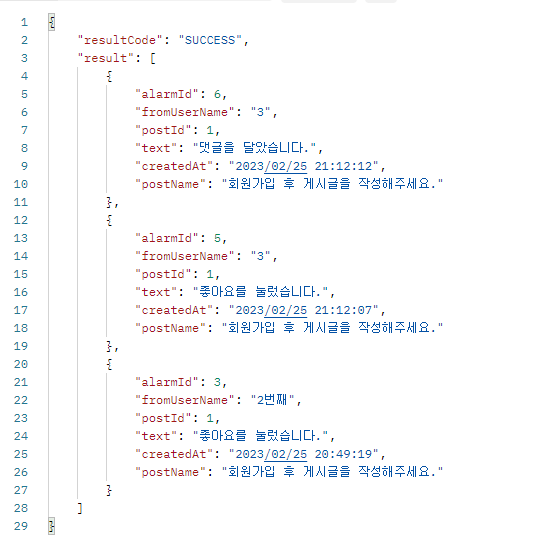
반환 결과는 위와 같다.
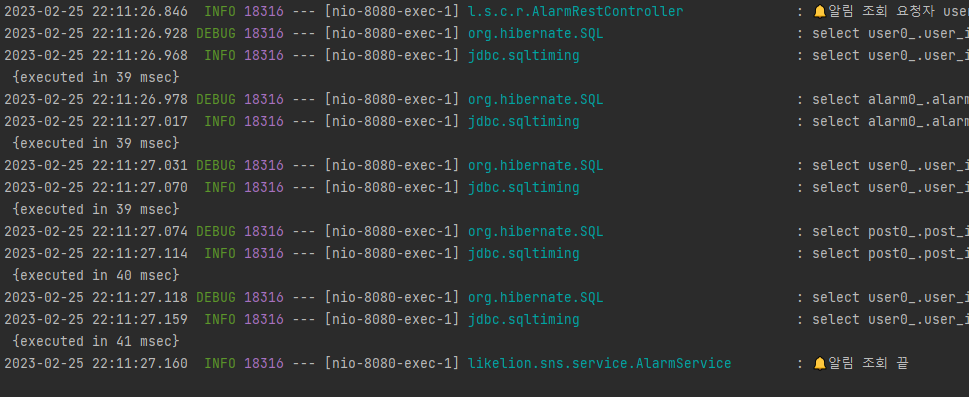
쿼리문의 총 갯수는 5개이고 총 실행 시간은 39+39+39+40+41ms = 198 ms
개선 후
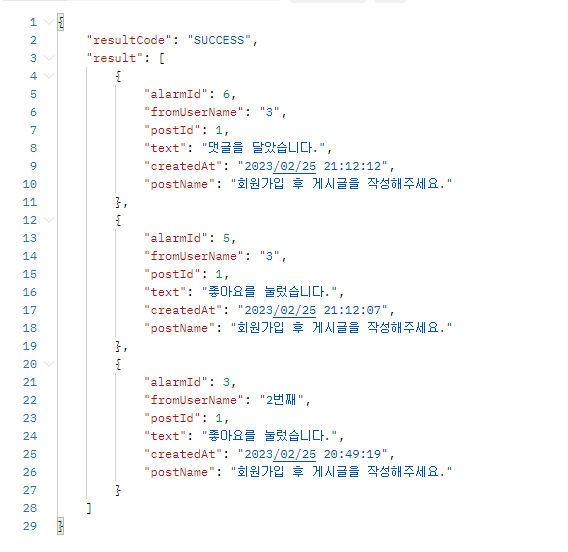
반환 결과는 당연히 동일하다.

쿼리문의 총 갯수는 2개이고 총 실행 시간은 37+38ms = 75ms이다.
결론
알람을 발생시킨 유저 or 알람이 발생된 게시글의 수가 늘어나면
개선 전의 경우 쿼리수는 더 늘어날 것이고 총 쿼리 실행시간도 계속 늘어날 것이다.
실제로 다른 사용자가 좋아요를 한번 더 눌렀을 때, 개선 전의 경우 쿼리문 하나가 추가되었고 39msec 가 추가되었다.
하지만, 개선 후의 상황의 경우

알람 조회 쿼리문의 실행 시간이 38ms 에서 40ms 로 아주 약간의 시간만 추가되었다.
참고 블로그 : https://kobumddaring.tistory.com/59